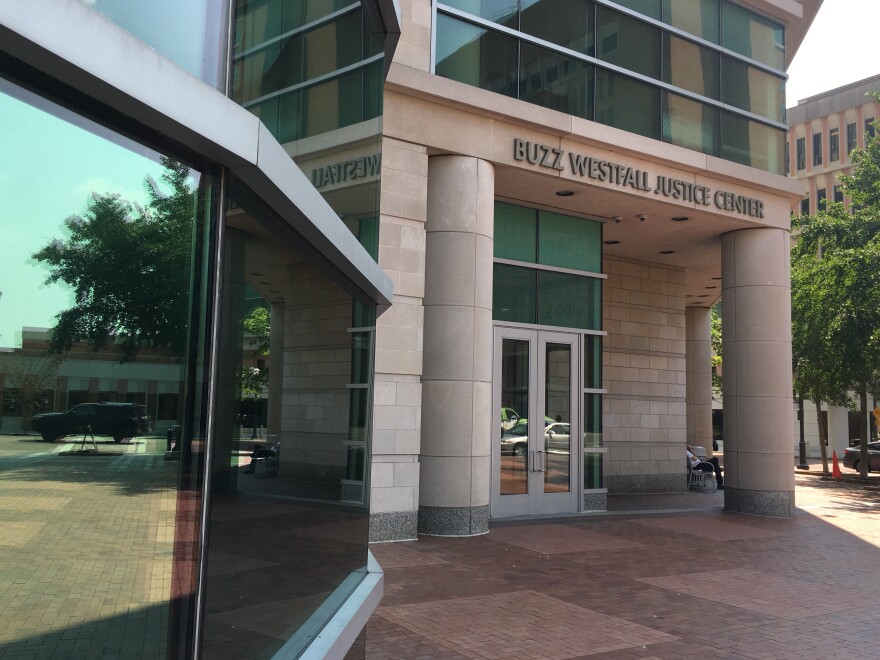Missouri is planning a statewide electronic monitoring program for people awaiting trial in local jails — with the hope of saving money.
The state put $5 million toward electronic monitoring in its current budget, but the program is still several months away from being launched.
Missouri is required to help counties and cities cover the costs of holding people in jail and transporting them to state prisons, but the state hasn’t been able to keep up with its payments — leaving local governments in a lurch. The state ended its last budget cycle in July owing cities and counties a total of $32.5 million.
Nearly every county, as well as the city of St. Louis, is waiting on funding from the state to cover the costs of holding people, according to documents provided by the Missouri Department of Corrections.
St. Louis County is owed more than any other locality, with $3.7 million in unpaid jail reimbursements as of three months ago. The city of St. Louis isn’t far behind, with a $3.5 million deficit, and St. Charles County is waiting on $933,000.
House Budget Committee Chairman Cody Smith, R-Carthage, said the state will never be able to make those back payments under its current financial restraints, unless it can drive down costs moving forward.
That’s why Smith is a proponent of the state launching an electronic monitoring program that counties and cities can opt into using. He said the only way the state will be able to pay down its debt is if local jail populations across the state decrease.
Based on 1979 law, the state is supposed to pay local governments $22.84 per offender per day for holding people who eventually end up in state prisons. St. Louis City Public Safety Director Jimmie Edwards said it costs about $80 per day to house someone in the city’s corrections facilities, which means the state is covering about a quarter of that expense.
Many local law enforcement officials would like to see the rate increase, but that is unlikely when the state is having a hard time paying its bills at the current rate.
“These are state crimes. These are state offenders, and the state should have some responsibility for housing them,” Edwards said.
The St. Louis County Council unanimously signed off on a justice services pilot program that would allow people awaiting trial to be monitored through an app on their phone. Cora Faith Walker, a former state representative and County Executive Sam Page’s director of policy, said the county is testing the waters of electronic monitoring, in anticipation of the state launching its own program several months from now.
While St. Louis County is ramping up to join whatever statewide program gets off the ground, several officials for state court in St. Louis weren’t aware that the state was preparing for statewide monitoring at all.
“If the city is pursuing something like that, they haven’t told us,” said Nathan Graves, the administrator for the state court that oversees the city.
Those city officials who were familiar with the state’s plans for electronic monitoring also sounded skeptical the plan would save money. Edwards, a former judge, said he didn’t think there were that many people in the city’s jails who would qualify for remote monitoring.
“We don’t have people locked up in our jails that don’t need to be locked up,” he said.
St. Louis already has electronic monitoring through ankle bracelets, though that program is controversial.
The participants are responsible for covering all of the fees associated with the monitoring, which can be as high as $300 per month. The process is being challenged in court by several civil liberties groups.
Even if electronic monitoring is already being used in the city, it could still opt into the statewide program once it launches.
It’s not clear whether the monitoring will come with any extra fees that the participants will have to pay.
At a legislative hearing earlier this month, Dusty Backes, with the Office of Administration, said the basic monitoring of people awaiting trial would be covered by the state’s $5 million appropriation, but judges may attach other types of monitoring that could result in extra fees for people in the program.
“If the judge wants to add alcohol monitoring to it, he can. I would assume he would pass that on to the offender; we wouldn’t pay for that,” he said.
Smith said the General Assembly isn’t looking to implement a program that would potentially cost people awaiting trial hundreds of dollars.
“I wouldn’t want to see us adopt a program that is prohibitively expensive,” he said.
Follow Julie on Twitter: @jsodonoghue
Send questions and comments about this article to: feedback@stlpublicradio.org.



